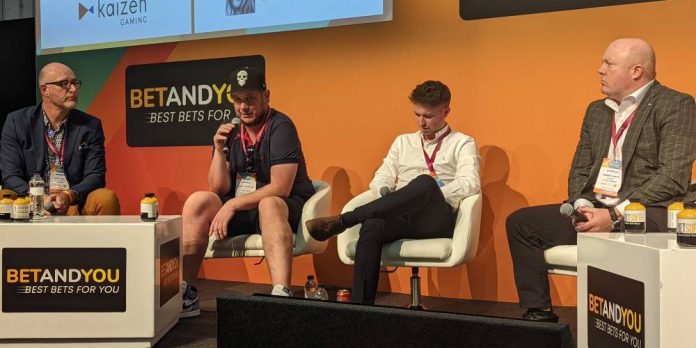SBC Summit Barcelona may be in Europe, but the interest in North America has been palpable at the event. No more so than at the panel on US and Canada affiliates, “The opportunity and challenges of affiliate marketing in US and Canada.”
The panel, which was moderated by Catie Di Stefano, Director of Community Marketing at OnlineGamblers.com featured the following experts:
- General Manager of Covers.com Mark Harper
- Atlas World Sports founder Robert Kraft
- Director of Online Media and Emerging Markets for Catena Media Darren Colebrook
- CEO of Fortuna Edge Media Aidan Toolan
Affiliate licensing impacts pricing and content
A recurring theme throughout the discussion was the need to approach North America jurisdiction by jurisdiction, particularly considering in many states affiliates need a license to work with regulated operators. Toolan noted you can either execute that licensing yourself or you can outsource it to a larger company if you are looking to scale. The nature of some of these licenses limits the scope of deals to CPA, however affiliates are more open to a rev-share model.
“Up to now, with the CPAs being so lucrative in the US, and in terms of the licenses that are required, we’d run most of our deals, if not all of them on a CPA basis. But it is an opportunity we are now looking at to be more to the ratio, and that for us is massively dependent on making sure you’re tracking what is working, and it comes down to our analysis on the users we drive, ensuring that the fair value is very high,” Toolan explained.
Local regulations are another reason affiliates focus on each state as its own market, and the same applies to operators. For states with few licenses or a small population, the opportunity for operators may not be there, which means the opportunity for affiliates is not there either.
“If you’re looking to get into the Canadian or US space, be careful because not all states are created equal. And that’s not just the application process. It’s also the opportunity and risk involved,” said Harper.
Branding at the local and national level
Big time affilaites like Catena Media are happy to take on every state, but they also had a bit of a head start on the competition.
“We took a gamble on the US market pre-regulation,” Colebrook told the audience. “We bought a huge US asset that was doing really, really well in igaming game as a foothold in the market, then essentially all we’ve done is continue to invest heavily, continue to buy things, continue to employ smart people, particularly around SEO and content.”
Those search behaviors are part of the reason the company’s general approach to content in the US is to create state-level sites, oftentimes launching multiple sites in a single state.
“Localization is key here. When you look at the really big affiliates, that’s where we’re going, we’re all going local first,” he added. “Everything else comes after it. There will be areas where national works. We’ve got TheLines, which is across the platform, but in reality, some local stuff works better for us.”
Covers.com, on the other hand, succeeds largely because the brand, which existed long before the repeal of PAPSA, is a recognizable name.
“We’ve got a very clear strategy of online branding and offline branding. I often tell the story of first time I went to Vegas, wearing a Covers hat, and walking through a sportsbook. I was stopped five or six times asking where they could get a Covers hat. I think our offline brand was always very strong in that respect,” noted Harper. “And I think we continue to do important work in offline branding but in terms of online branding, paid media, and as the panel has already mentioned, search engine optimization is king, I think because the Covers brand has been around for 27, almost 28 years, we have incredibly strong domain authority, and that’s a national authority that we have across Canada and the US.”
Canada’s inducement prohibitions still a struggle for affiliates
Each US state is its own market, but by and large, affiliates function in the same way. Ontario, on the other hand, remains a tricky jurisdiction for affiliates since inducement advertising is expressly prohibited and strictly policed. Even though affiliates do not need a license and operators are responsible for any regulatory violations, affiliates are still frustrated.
“With all due respect to the beautiful country of Canada, that decision that they made, I don’t understand as an affiliate how you’re supposed to market to somebody but you can’t share in actually making a transaction,” Kraft lamented.
Harper noted these obstacles are particularly frustrating when you consider a recent Better Collective survey that indicated lots of confusion around the subject but also quite a bit of interest. He is optimistic about the future though, as he was on a call with the Alcohol and Gaming Commission of Ontario (AGCO) last week and the topic came up.
“The regulators are very strict in Canada, in my opinion, wrongly so because it’s part of the conversation as part of the messaging for all of us who are sitting here and for the operators, but we’re restricted in Canada to not be able to showcase bonuses or promotions. Sounds like they’re open to some kind of dialogue, which is good.”
Colebrook built off Harper’s observation, adding that sports betting is much easier to market without bonuses, but it is online casino that is really struggling to capture a new audience.
After Ontario’s first set of numbers for the industry underperformed in many eyes, sites are now shifting to what the next big US market will be. The panel agreed that Texas, California, and Florida are the three big states to hold out hope for, but passage or expansion in the near term.
Of the states on the verge of launching, Kraft has one, in particular, he expects big things from.
“I think that’s one of the states is going to be in my opinion, kind of sleeper state. You have the city of Cleveland, you have Cincinnati, Columbus, all three major markets in the United States, as they are their own cities. And that’s a state that loves their sports.”















